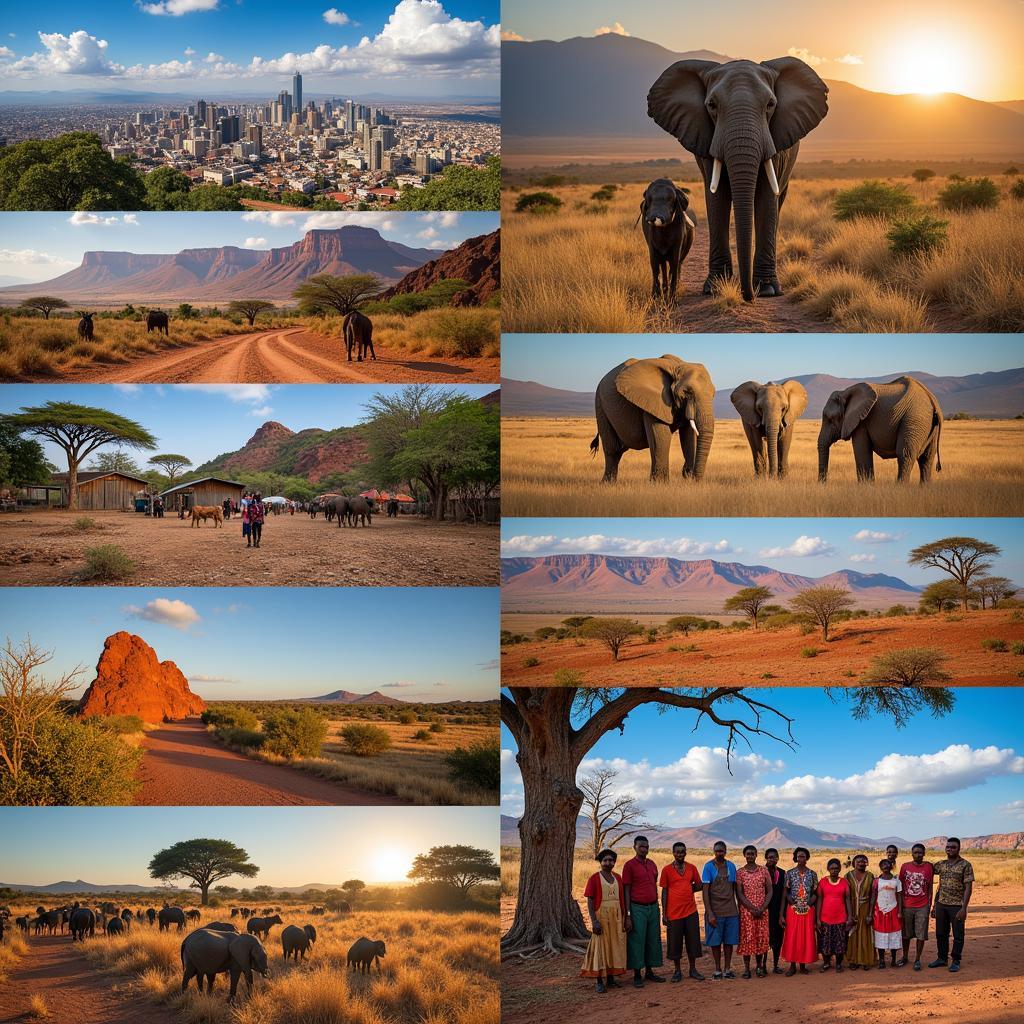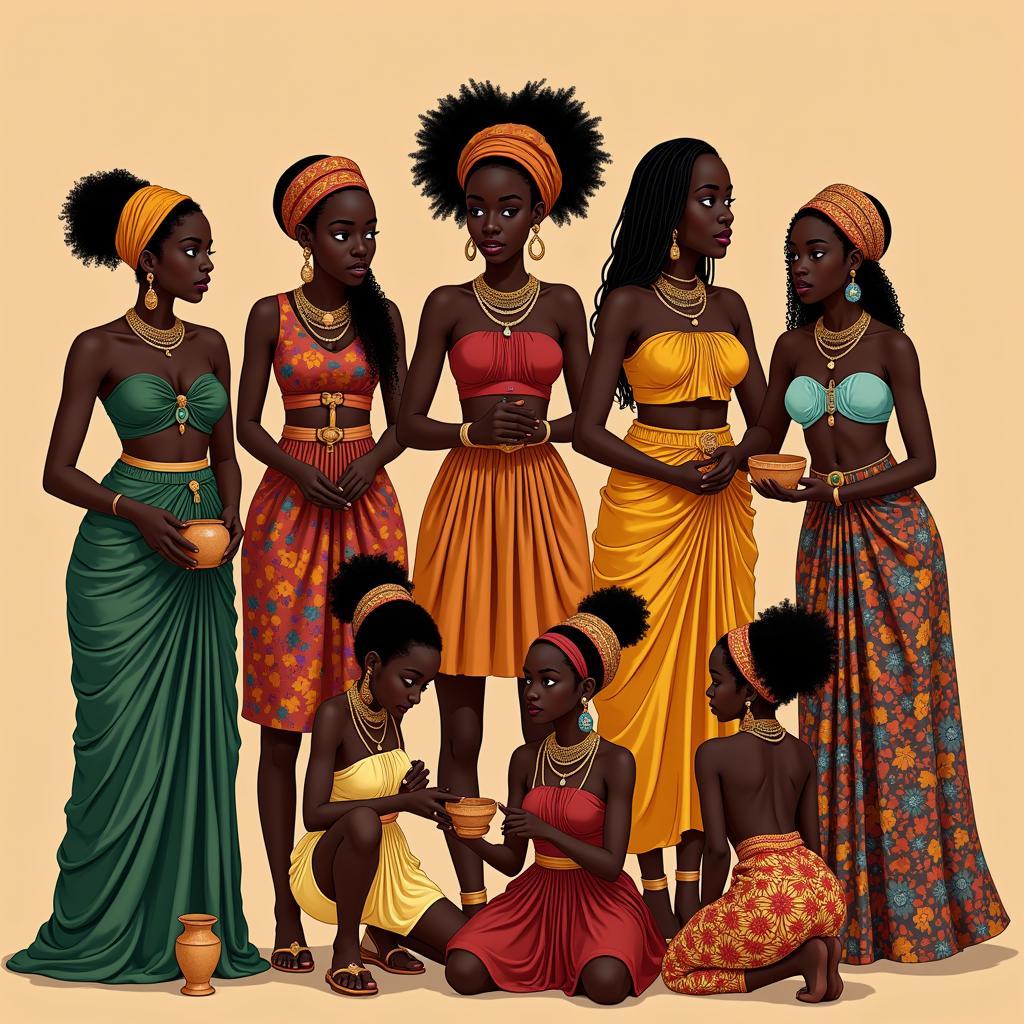African Countries and Capitals in Alphabetical Order
A comprehensive guide to African Countries And Capitals In Alphabetical Order provides a valuable resource for anyone interested in learning more about this diverse continent. This list not only offers a quick reference but also serves as a starting point for deeper exploration of each nation’s unique culture, history, and geography.
Navigating the Diverse Landscape of African Countries and Capitals
Africa, the second-largest continent, boasts a rich tapestry of cultures, languages, and landscapes. Understanding its political makeup begins with knowing its constituent nations and their administrative centers. list of african countries and capitals in alphabetical order offers a structured way to navigate this complexity.
Algeria to Comoros: A Journey Through North and East Africa
Our alphabetical journey begins in North Africa with Algeria, whose capital is Algiers, a bustling port city steeped in history. Moving southward, we encounter Angola, with its capital Luanda, a vibrant hub on the Atlantic coast. Benin, with its capital Porto-Novo, showcases West Africa’s unique blend of tradition and modernity. Botswana’s capital, Gaborone, represents a stable democracy in Southern Africa. Burkina Faso, with its capital Ouagadougou, offers a window into the Sahel region. Burundi, with its capital Gitega, highlights East Africa’s complex political landscape. Cabo Verde’s capital, Praia, a picturesque island city, reflects the nation’s Portuguese colonial past. Cameroon, with Yaoundé as its capital, reveals Central Africa’s diverse ecosystems. The Central African Republic, with its capital Bangui, stands as a testament to the continent’s ongoing challenges. Chad’s capital, N’Djamena, represents a crucial crossroads in the Sahel. The Comoros, with its capital Moroni, adds a unique island perspective to East Africa.
Democratic Republic of Congo to Mauritius: Central and Southern Africa Explored
From the Democratic Republic of Congo, with its capital Kinshasa, to the island nation of Mauritius, with its capital Port Louis, this section showcases the heart and south of Africa. Djibouti, with its capital Djibouti City, holds strategic importance in the Horn of Africa. Egypt, with its ancient capital Cairo, stands as a cradle of civilization. Equatorial Guinea, with its capital Malabo, represents Central Africa’s oil-rich nations. Eritrea’s capital, Asmara, showcases unique architectural heritage. Eswatini, with its capital Mbabane, represents a small but culturally rich monarchy in Southern Africa. Ethiopia, with its capital Addis Ababa, holds a prominent place in African history. Gabon, with its capital Libreville, boasts rich biodiversity. The Gambia, with its capital Banjul, is a small West African nation known for its riverine landscapes. Ghana, with its capital Accra, represents a vibrant democracy in West Africa. Guinea, with its capital Conakry, is rich in mineral resources. Guinea-Bissau, with its capital Bissau, faces ongoing developmental challenges. Ivory Coast, with its capital Yamoussoukro, plays a significant role in West African economics. Kenya, with its capital Nairobi, is a major economic hub in East Africa. Lesotho, with its capital Maseru, is an enclave within South Africa. Liberia, with its capital Monrovia, has a unique history tied to the United States. Libya, with its capital Tripoli, navigates a complex political landscape. Madagascar, with its capital Antananarivo, showcases unique flora and fauna. Malawi, with its capital Lilongwe, faces agricultural and economic challenges. Mali, with its capital Bamako, possesses a rich cultural heritage. Mauritania, with its capital Nouakchott, represents the western edge of the Sahara Desert. Mauritius, with Port Louis as its capital, is a renowned tourist destination.
 African Countries: Central and South Africa
African Countries: Central and South Africa
Morocco to Zimbabwe: Completing the African Alphabet
Morocco, with its vibrant capital Rabat, opens this section covering North and Southern Africa. Mozambique, with its capital Maputo, faces post-conflict reconstruction. Namibia, with its capital Windhoek, boasts stunning desert landscapes. Niger, with its capital Niamey, grapples with development challenges in the Sahel. Nigeria, with its capital Abuja, is Africa’s most populous nation. Rwanda, with its capital Kigali, has undergone significant post-conflict development. São Tomé and Príncipe, with its capital São Tomé, offers a unique island experience. Senegal, with its capital Dakar, is known for its vibrant culture. Seychelles, with its capital Victoria, is a tropical paradise. Sierra Leone, with its capital Freetown, is recovering from a devastating civil war. Somalia, with its capital Mogadishu, faces ongoing security challenges. South Africa, with its administrative capitals Pretoria, Bloemfontein, and Cape Town, plays a dominant role in Southern African politics and economics. african countries and capitals alphabetical order offers a helpful guide to this diverse nation. South Sudan, with its capital Juba, is the world’s newest nation. Sudan, with its capital Khartoum, is navigating a period of political transition. Tanzania, with its capital Dodoma, is renowned for its wildlife and natural beauty. Togo, with its capital Lomé, represents West Africa’s coastal nations. Tunisia, with its capital Tunis, played a key role in the Arab Spring. Uganda, with its capital Kampala, boasts rich biodiversity. Zambia, with its capital Lusaka, is a major copper producer. Zimbabwe, with its capital Harare, concludes our alphabetical journey through African countries and their capitals.
african countries alphabetically offers a simplified view, but including the capitals enriches the understanding of each nation’s geopolitical context. For those interested in the geographical size of African nations, african country with largest area provides further insight.
“Understanding African countries and their capitals is essential for appreciating the continent’s diversity,” notes Dr. Abimbola Adebayo, a renowned African Studies scholar. “This knowledge forms the foundation for exploring the unique history, culture, and political landscape of each nation.”
Conclusion
Knowing African countries and capitals in alphabetical order is more than just memorizing a list; it’s a gateway to understanding a continent brimming with diverse cultures, histories, and potential. This comprehensive guide provides a structured approach to navigating the political geography of Africa, empowering you to delve deeper into the unique story of each nation.
FAQs
- How many countries are there in Africa? There are 54 recognized sovereign countries in Africa.
- What is the largest country in Africa? Algeria is the largest country in Africa by land area.
- What is the smallest country in Africa? Seychelles is the smallest country in Africa by land area.
- What is the most populous country in Africa? Nigeria is the most populous country in Africa.
- Which African country has the most capital cities? South Africa has three capital cities: Pretoria (administrative), Bloemfontein (judicial), and Cape Town (legislative).
- Why is it important to know African countries and their capitals? Understanding African countries and their capitals provides a foundation for understanding the continent’s diverse political, economic, and cultural landscape.
- Where can I find more information about specific African countries? Numerous online resources, including encyclopedias and government websites, offer detailed information about individual African countries.
Need more help? Contact us at:
Phone: +255768904061
Email: [email protected]
Address: Mbarali DC Mawindi, Kangaga, Tanzania
Our customer service team is available 24/7.



